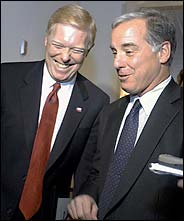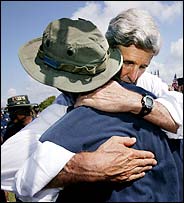

 |
| Associated Press |
| Richard A. Gephardt, left, has been talking about his family on the campaign trail, often in great detail. Howard Dean, with Mr. Gephardt, is less likely to discuss personal matters. |
 |
| Getty Images |
| John Kerry, pictured with a fellow veteran, invariably mentions his Vietnam War service, which he calls "part of who I am." |
![]() OS ANGELES, Sept. 6 - John Edwards, a candidate for the Democratic presidential nomination, cannot pass a crowd these days without talking about his father the millworker or growing up in rural North Carolina. For Richard A. Gephardt, the campaign stories are about his father the milk truck driver and his son's successful battle with colon cancer.
OS ANGELES, Sept. 6 - John Edwards, a candidate for the Democratic presidential nomination, cannot pass a crowd these days without talking about his father the millworker or growing up in rural North Carolina. For Richard A. Gephardt, the campaign stories are about his father the milk truck driver and his son's successful battle with colon cancer.
But spend a day with Howard Dean and it is almost as if his life began the day he stepped behind the governor's desk in Vermont 12 years ago. Senator Joseph I. Lieberman is far more animated talking about the intricacies of trade policy than in sharing stories about growing up in Stamford, Conn.
A striking stylistic divide has emerged among the Democratic candidates as they struggle to determine the extent to which they can - or should - build candidacies on often intimate details of their lives, in an era that celebrates the public airing of the most personal of tales.
Their responses - from the intense intimacy of Mr. Gephardt to the rigorous avoidance of personal biography that has characterized Dr. Dean's candidacy - reflect fundamentally different calculations by the candidates about what voters are looking for in this election.
But they also illustrate disagreements among the candidates over what is appropriate to talk about in the context of a political campaign, and the complexity of divulging intimate details that might enhance their standing without appearing to exploit personal tragedy for political gain. That perception dogged Vice President Al Gore when he ran for president in 2000, a cautionary lesson for many Democrats this time.
Some Democrats said that even before Bill Clinton changed the way campaigns were conducted by disclosing that his stepfather had abused his mother, the first task of any campaign was to introduce the life of a candidate to voters. From this point of view, voters assess candidates based on who they are and how they have lived, before they consider their political views.
``It gives people a reason to believe that when I say I'm going to do X, Y and Z, that I'm really committed to it,'' Mr. Edwards, a senator from North Carolina, said in an interview in Iowa last month. ``What people have to see is how sincere and authentic you are - and I think your personal background is directly relevant to that.''
But other Democrats argue that the appetite for homey anecdotes might prove limited in an election taking place against a backdrop of threats from abroad and a weak economy at home. And some suggested that voters might be recoiling from an excess of personal information that marked Mr. Clinton's years in Washington, and are looking for less confessional candidacies, which may account for some of early success of Dr. Dean..
``Howard's life is an open book, but frankly he thinks what people are more interested in is how he's going to improve their lives, rather than where he grew up and where he went to school,'' Steve McMahon, a senior adviser to Dr. Dean, said. ``He thinks it's much more relevant and important to people to understand what he thinks the president is doing wrong for the country. Not so much, `I grew up here, I grew up there, my parents were this, my parents are that.'''
Robert Schmuhl, a professor of American studies at the University of Notre Dame, said the nomination contest thus far, as reflected by Dr. Dean's success and the difficulties experienced by Mr. Edwards and Mr. Gephardt, signaled that the campaign of personal disclosure has been eclipsed by hard-edged appeals based on partisanship and issues.
``The personal and biographical might not be as critical as it once was,'' Mr. Schmuhl said. ``The red-meat statements are much more compelling than the biography.''
``There are a whole of lot people,'' he said, ``who came out of the Clinton imbroglio and said: `There are certain areas where you crossed a line, and don't cross it now. And give me substance.'''
Democrats said these divisions that have emerged reflect, at least in part, long-observed variations in cultural sensibilities in different parts of the nation. Candidates from the North - Mr. Dean, Mr. Lieberman of Connecticut and Senator John Kerry of Massachusetts - are more reserved and less likely to dwell on the intimate details of growing up or personal tragedies than the candidates from the South and Midwest. Those candidates include Mr. Edwards, Mr. Gephardt of Missouri, and Senator Bob Graham of Florida.
And there are elements of economic class at play. Candidates from working-class backgrounds are much more likely to promote their life stories than someone who grew up wealthy. Accordingly, Mr. Gephardt and Mr. Edwards have woven stories of their modest upbringings into their standard campaign speeches; revealingly, there is a 30-year gap in Mr. Edwards' story, which stops about the moment he becomes a wealthy trial lawyer, living in the Georgetown section of Washington.
By contrast, growing up as the son of a stockbroker on Park Avenue and spending the summer on Long Island - as Dr. Dean did - is not exactly the stuff of the compelling presidential biography.
After Mr. Gephardt ran for president and lost in 1988, some Democrats said he had failed because he had run a soulless campaign based only on his experience in Congress, making it difficult for voters to identify with him.
These days, Mr. Gephardt's appearances feel almost like a confessional. He talks, often in abundant detail, about his son's fight with cancer, about how one daughter is a lesbian, and about the recent death of his mother.
``Your personal experience is what shapes your views and your character and your values, and I think he's done a very good job in using that personal experience in communicating voting,'' his campaign chief of staff, Steve Elmendorf, said.
Aides to rival candidates suggest that Mr. Gephardt, more than anyone else in the race, risks the problem Mr. Gore encountered of crossing the line between recounting and exploiting. But there is no evidence that that has happened so far.
That said, Mr. Gephardt is not the only person running for president who has endured personal tragedy, but he stands apart in his willingness to share. Dr. Dean rarely talks about his brother, who was killed while traveling in Laos in 1974.
And Mr. Edwards, for all his reliance on his biography, will not talk about the death of his teenage son seven years ago.
When Mr. Edwards was being trailed by an ABC News crew doing a profile on him for ``This Week With George Stephanopoulos,'' a New Hampshire voter asked if his son's death had ``altered or reinforced your political views.''
``I appreciate you asking - it's a perfectly fair and reasonable question,'' Mr. Edwards said. ``I would respectfully decline to answer. I think that's personal to me and personal to my family.''
Mr. Kerry invariably mentions his Vietnam service; he talks less regularly about growing up as the son of a foreign service officer.
In an interview, Mr. Kerry suggested that his experience in Vietnam was more relevant to voters than the circumstances of his upbringing. ``I don't think that's why people elect you,'' he said.
Vietnam, he said, ``is part of who I am.
``I mean, Edwards talks about being the son of a millworker, Lieberman talks about whatever, and Gephardt talks about his father,'' Mr. Kerry said. ``I talk about my life.''
At the other end of the spectrum, Dr. Dean defines himself solely by what he stands for, and not by who he is. Lengthy discussions of health insurance are never leavened with anecdotes from his years practicing medicine.
The sense of Dr. Dean as a candidate without a life outside the spotlight is reinforced by the nearly complete absence from the campaign trail - either in person or as a mention - of Dr. Dean's wife. (Her name is Judith Steinberg, and she is also a doctor.)
At one point, asked what he would tell Ms. Steinberg about a remarkable four-day cross-country campaign swing last month upon his return, Dr. Dean demurred, telling reporters they might not even discuss it.
``Does your wife know you're running for president?'' a reporter asked him archly. Dr. Dean could not help but laugh.